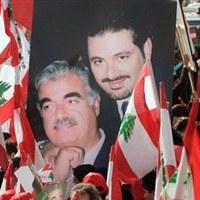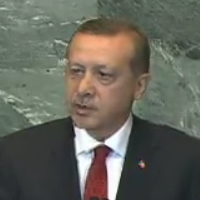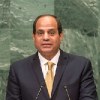![]()
Mon, Sept 26, 2011 | UN TV

Taïb Fassi Fihri, Minister for Foreign Affairs and Cooperation of the Kingdom of Morocco (UN Photo/JC McIlwaine)
FM Taïb Fassi Fihri Addresses the General Debate of the 66th Session of the General Assembly
Address by His Excellency Mr. Taïb Fassi Fihri, Minister for Foreign Affairs and Cooperation of Morocco at the General debate of the 66th Session of the General Assembly of the United Nations (New York, 21-24 and 26-30 September 2011).
Morocco, General Debate, 66th Session
66th Session ofthe United Nations General Assembly
Statement delivered by His Excellency M. Taib Fassi FIHRI,
Minister of Foreign Affairs and Cooperation
26 September 2011
Mr. President,
Your Highness and Excellencies,
M. Secretary-General,
Ladies and gentlemen,It is a great pleasure for me to extend to you, Mr. President, on behalf of the Kingdom of Morocco, my sincere congratulations for your election as President of the Sixty sixth session of the General Assembly. Your entrustment with this assignment reflects the esteem enjoyed by the brotherly State of Qatar and the Arab world. We are confident that your rich diplomatic experience will allow for the success of this session.
We are also pleased to express to your predecessor, Mr. Joseph Deiss, our tribute for the successful efforts he deployed throughout his presidency.
We also reiterate the expression of our congratulations to Mr. Ban Ki-moon for his reelection as Secretary-General of the United Nations. We highly value the initiatives undertaken during his first mandate, in particular the establishment of UN Women, and fully support the priorities set for his second term.
Mr. President,
This session takes place in a sensitive international context where the world is facing acute and complex crises, some of which are structural and persistent such as climate change and the food crisis, while others are circumstantial such as the unprecedented financial crisis which turned into an international economic crisis with destabilizing social and political consequences.
The world is also challenged by recurrent natural disasters and nuclear accidents, as well as the continued threat of international terrorism, a decade after the horrific events of 9/11, with its growing links with transnational organized crime in all its forms, in addition to the persistence of areas of national and international tensions and armed conflicts.
This critical situation, the world has rarely witnessed, calls upon us to reflect on the following questions: what United Nations Organization do we seek to address these issues?
How can we ensure that the UN is an influential and efficient legal and political framework for the collective management of the world’s global affairs?
How can we ensure the effectiveness organization’s organs to adapt to the fast changing world?
And finally how do we confirm the role of this Organization as the principal axis of a multilateral system based on solidarity while being coherent with new groupings, which have limited membership but are endowed with the ability to promptly respond to new events?
These questions are not based on an idealistic approach but rather emanate from our deep belief in the highly important and unique role of the UN as a framework and a reference for efficient and just global governance based on solidarity, which draws its legitimacy from its global membership and the capital it has accumulated since its establishment.
This global governance is the natural extension of national, regional and sub-regional governance. All Member States should take up their responsibilities in adopting the appropriate measures at the national level so as to lay down the foundation and consolidate the good governance.
On this basis, the Kingdom of Morocco has opted, several decades ago, for the establishment of a democratic state based on good governance, the guarantee of individual freedoms and dignity of its citizens, the respect for human rights, while upholding the principles of equality and equal opportunities, social justice, as well as the fight against marginalization and social exclusion.
The Kingdom, through to the insightful vision of His Majesty King Mohammed VI, has also based the establishment of a democratic and advanced society on two interdependent pillars: the deepening of political reforms and the advent of human development.
The recent adoption of the new Constitution of the Kingdom, through a popular referendum, came in as a historical development in this distinctive process, which highlights the cohesion between all components of the Moroccan nation with its multiple confluents, and consolidates the principles of the separation and the balance of powers while preserving the total independence of the judiciary power and the Rule of Law.
It provides for the enforcement of human rights as universally recognized, defines the rights and duties of citizenship, and lays the foundations for political and economic governance through institutions of control, regulation and mediation. It also strengthens the participation of women in politics and in social and economic development.
In this context, advanced regionalization enjoys a central role in this innovative constitutional architecture, as the backbone of proximity democracy, which aimed at achieving development based on balance and solidarity between all regions of the kingdom.
Mr. President,
The Arab world is witnessing profound events and transformations that underline, on the one hand, that the legitimate aspirations to freedom, dignity, progress and global values concerns all regions, cultures and religions without exception.
These events also show, on the other hand, that social and economic development can not be achieved without political openness and democratic evolution. There could be neither progress nor stability in the context of political stagnation, ideological closure, the erosion of legitimacy and the absence of any renewal and political changeover.
Lastly, these events have also shown that each Arabic country has the capacity to build a political system that reconciles universal values and national specificities, a system that brings together the necessary openness and the preservation of cultural and civilizational identity.
In this regard, Morocco appreciates the institutional steps taken by Tunisia and Egypt, and calls on the international community to support their efforts on the complex and sensitive path of democratic transition.
Morocco also expresses its satisfaction with the presence of a delegation of the Transitional National Council (TNC), representing the Libyan people which look forward to a better and promising future, a future based on freedom, openness, reconciliation and consolidation of the rule of Law.
In light of the solidarity and the brotherly links and historical ties between the peoples of Morocco and Libya and their common destiny, Morocco has from the very beginning supported the legitimate aspirations of the Libyan people, and all the moves and initiatives undertaken by the TNC at the national and international levels.
Morocco is also confident that Libya will regain its natural position within the international community in particular in its Maghreb neighborhood.
Concerning Syria and Yemen, Morocco hopes that Arab diplomatic initiatives will prevent further bloodshed and guarantee a peaceful resolution of the crisis in the two brotherly countries through the announced deep reforms, in a manner consistent with their territorial integrity and that preserves their stability.
These aspirations and changes, reflecting the free will of the peoples, require an effective support from their Arab brothers and partners in full respect of their specificities and in a harmony with their national history, while taking into account the progress achieved by each country in the democratization process.
In this context, Morocco highly appreciates the response by the G8 through the “Deauville Partnership”.
Morocco considers that, in addition to its financial support, this prornising Partnership constitutes an incentive that will encourage the five Arab beneficiary countries to rely on their own capacities and enhance their economic integration, on the one hand, and to share experiences and best practices in the field of democratization and constitutional reforms, on the other hand.
Morocco is willing to work with its brothers in this framework, given its experiences in the field of democratic transition and political openness, as well as its distinctive achievements in the constitutional architecture.
In light of the profound transformations and the persistent challenges experienced by the Arab world, it has become necessary to develop a new regional governance, based on regional integration in the framework of harmonious and complementary groupings such as the Maghreb Arab Union, the Gulf Cooperation Council and the Agadir Agreement for an Arab Mediterranean Free Trade zone. The latter could be enlarged to include other Arab Mediterranean countries and could extend its activities to areas of democratic reform and political dialogue.
This new governance, under the umbrella of the Arab League, aims at building a new Arab order based on innovative mechanisms and methods, to serve human development, economic integration and democratic openness, and to prevent conflicts and the danger of separatism.
A final solution to the Palestinian issue is a necessary factor towards accelerating the pace of this Arab endeavor in the interest of all the peoples of the regions.
Mr. President,
The question of Palestine is at a historical turning point characterized by the absence of any prospect of negotiation and the deterioration of the situation on the ground, due to the ongoing settlement plans and the policy of detention, annexation, destruction, and displacement, particularly in eastern Jerusalem, as well as collective oppression and excessive use of force as reported by the United Nations including in the report on the “Freedom Flotilla”.
The situation has been exacerbated by the Israeli government’s rejection of constructive international initiatives and proposals by the sponsors of the peace process. This has led to the miscarriage of all efforts aiming at re-Iaunching effective and serious peace talks on the issues of the final status and in accordance with their bilateral commitments.
It is time for the Organization of the United Nations, through its various organs, and using all possible mechanisms, to fulfill its responsibilities to enable the Palestinian people, under the leadership of its national authority, to achieve all of its national legitimate rights. This should be consistent with the efforts made to strengthen the foundation of an independent Palestinian State in light of the large international recognition and support, that serve as a clear indication of the firm international belief in the legitimacy of this historical and unavoidable decision.
The Kingdom of Morocco, which has been the first to push for and defend the peaceful option, and to support the struggle of the Palestinian people throughout its different phases, cautions against the dangers lying behind the stalemate of the peace process due to the logic of force and alienation that could only lead to the worst scenarios.
In this spirit, Morocco reiterates its support to the request by His Excellency President Mahmud Abbas, on behalf of the Palestinian leadership, of their adhesion to the United Nations as a sovereign State on the basis of the 1967 borders with eastern Jerusalem as its Capital.
Morocco, under the leadership of His Majesty King Mohammed VI, Chairman of AI Quds Committee of the OIC, will spare no effort in pushing forward efficient actions and will contribute to constructive endeavors towards achieving this goal at the earliest.
Our collective goal is the revival of the peace process on the basis of clear terms of reference, a comprehensive agenda, a specific time frame and an innovative negotiation method associated with the strong and active involvement of the sponsors of the peace process. In this regard, the Kingdom of Morocco welcomes the positive signals in the recent statement by the Quartet.
Mr. President,
Consistent with its vision of solidarity and integration in the Arab region, Morocco is engaged in large consultations with the members of the Gulf Cooperation Council to establish an advanced partnership in various strategic, political, economic and social fields.
Morocco which has strong ties with all members of this important regional grouping, endeavors towards the establishment of a new type of concrete and distinctive partnership, that would contribute largely to sustainable development, stability and the containment of the threats to the safety and security of our countries and their territorial integrity while securing their interests.
In this context, Morocco renews its support to the legitimate rights of the United Arab Emirates with regards to its three occupied islands.
Mr. President,
Morocco’s Maghreb, Arab, Islamic, Mediterranean and African dimensions, as well as its commitment to strengthening South-South cooperation, as enshrined in its new constitution, contribute to the diversity of the issues on which Moroccan foreign policy is based, and is consistent with its aspiration for establishing a regional governance founded on consultation, dialogue and solidarity.
The recent developments in the Maghreb could give a new impetus to the Maghreb integration, consistent with the aspirations of the peoples of the region to seize existing opportunities to achieve development and stability.
In this context, Morocco has worked relentlessly to activate bilateral relations with brotherly Algeria through ministerial visits and hopes that this will be conducive to a comprehensive normalization between the two countries, including the opening of terrestrial borders.
Inspired by the same will, Morocco reiterates its full readiness to pursue and intensify the negotiation process to find a consensual political solution to the artificial regional dispute over the Moroccan Sahara, on the basis of the autonomy initiative that the Security Council has considered, through six successive resolutions, as serious and credible.
Such an audacious and realistic initiative takes into consideration, within the framework of our national integrity and territorial sovereignty, the norms of international law and goes beyond restrictive interpretations that can only nurture the stalemate situation.
Security Council resolution 1979 (2011) renewed the emphasis on the fundamental guidelines of the political process by calling for substantive and serious negotiations, realism and the spirit of compromise, to reach a middle solution, while urging neighboring countries to fully engage in the process of negotiations.
It is time for each party to live up to its responsibilities, particularly in light of the events occurring in the region, to work seriously and in good faith in order to reach a final political compromise to this artificial regional dispute, to meet the aspirations of our brothers in the Tindouf camps, where they are deprived from the most basic human rights.
From this podium, I reiterate the persistent need to achieve an effective Maghreb integration in the framework of the Arab Maghreb Union as an open, complementary and democratic space to serve the interests of the peoples of the five countries:
- A Maghreb that contributes in an effective and innovative manner to the present dynamic in the Arab region;
- A Maghreb that contributes actively to Euro-Mediterranean cooperation as illustrated by the Union for the Mediterranean;
- A Maghreb that contributes actively to the development and stability in the Sahel-Saharan region which witnesses terrorist threats and Incursions of transnational organized criminal networks.
Mr. President,
The Kingdom of Morocco, as a founding member of the Organization of the African Unity, has placed its African policy on top of its Foreign Policy’s priorities through an ambitious cooperation and partnership program based on a holistic conception of development so as to meet the economic, social, political and security challenges that the continent is facing.
With the same commitment, Morocco contributed positively to regional and international efforts for the settlement of several conflicts. The Kingdom has steadfastly contributed for more than fifty years to United Nations Peacekeeping Operations. In Africa, in particular, Morocco has accompanied actively the transitional democratic process, difficult in some cases, such as in Guinea, Cote d’ivoire and Niger.
Morocco has worked relentlessly to develop consultations and coordination among African countries. In this regard, the Kingdom along with other African brothers launched the Conference of African Atlantic States with the aim of optimizing the cooperation opportunities created by this common area and to overcome the common challenges, in particular those related to security and environment.
There is no doubt that the achievement of the goal of sustainable development in developing countries, mainly in Africa, remains a daunting challenge, as far as the gap persists between international assistance for development which has decreased due to the international financial and economic crisis and the heavy burden of debt on developing nations.
We invite the international community to increase its support to African countries as a matter of priority in order to achieve the Millenium Development Goals. We also call upon the countries, international organizations and the partners to fulfill their commitments in this regard.
Morocco looks forward to concrete results for the High Level Dialogue on Financing for Development, to take place next December. Our hope is that this meeting reestablishes confidence between the developing nations and their partners and gives an impetus to the Monterrey Consensus. Morocco reiterates the importance of the Royal initiative calling for a High-Level Meeting at the General Assembly of the United Nations on Investment in Africa.
In a spirit of solidarity with the Small Island States in the Caribbean region, as well as in the Pacific and Indian oceans, Morocco stands ready to contribute to any initiative within the framework of the Mauritius Strategy aiming at meeting the environmental and development challenges that these countries are facing.
Mr. President,
With this clear vision and these constructive orientations reflecting the adequacy between the domestic and foreign policy priorities, the Kingdom of Morocco looks forward to the support of the members of the General Assembly for its candidature for a non-permanent seat in the Security Council for the biennium 2012-13. In accordance with the rotation principle within the African Group, this bid reflects Morocco’s aspiration to serve Peace and stability, to strengthen Solidarity and to Uphold Universal ideals.
— This candidacy serves first and foremost the goal of maintaining peace and security, which the newly established Moroccan constitution considered as an international obligation due to the longstanding experience of the Kingdom in the field, of more than half a century, during which more than fifty thousand Moroccan peacekeepers have participated in Peacekeeping Operations.
It is in this context, that Morocco is participating actively in the work of the Committee on Peacekeeping, which represents an effective instrument to invigorate international solidarity with countries emerging from conflicts and those entering a peace building process.
It’s in this spirit, that Morocco is deeply committed to its international obligations towards disarmament and non-proliferation of weapons of mass destruction.
— Secondly, this candidacy will enhance the solidarity among developing countries as part of south-south cooperation bringing up new mechanisms based on a new vision. This cooperation is illustrated through the folloWing actions:
–Offering humanitarian assistance in order to face natural disasters and food cnsls particularly in Sub Saharan African Countries as well as the Caribbean States and Pacific Islands.
— Establishing financial and technical assistance in economic and social areas, such as agriculture, health, water and electricity.
–Giving the opportunity to more than 9000 students from 42 countries, among them 8000 are granted scholarship, to continue their advanced studies in Morocco’s Universities and Schools.
The Candidacy of Morocco finally reflects the diversity, the richness and openness of the Kingdom of Morocco as a crossroad of civilizations, land of peace and coexistence between different cultures and religions.
Giving its true belief in the Universal principles and values of human rights, the Kingdom took a several initiatives aiming to strengthen the culture of human rights, such as the review of Human Right Council mechanism, given its leading role in proposing and monitoring the respect of human rights within United Nations system.
We are truly confident that your support to the Moroccan candidacy, which comes at a very specific regional context, will allow the Kingdom, during its mandate in the Security Council, the opportunity to deal with the African and Arab issues that are currently on the agenda of the Security Council, in a realistic, balanced and constructive manner.



 RSS
RSS










FM Taïb Fassi Fihri Addresses the General Debate of the 66th Session of the General Assembly | Middl http://t.co/E6EZucgE
FM Taïb Fassi Fihri Addresses the General Debate of the 66th Session of the General Assembly | Middl http://t.co/E6EZucgE